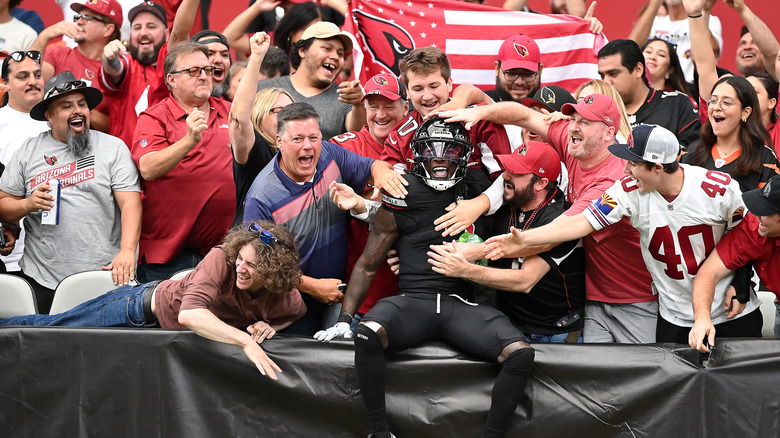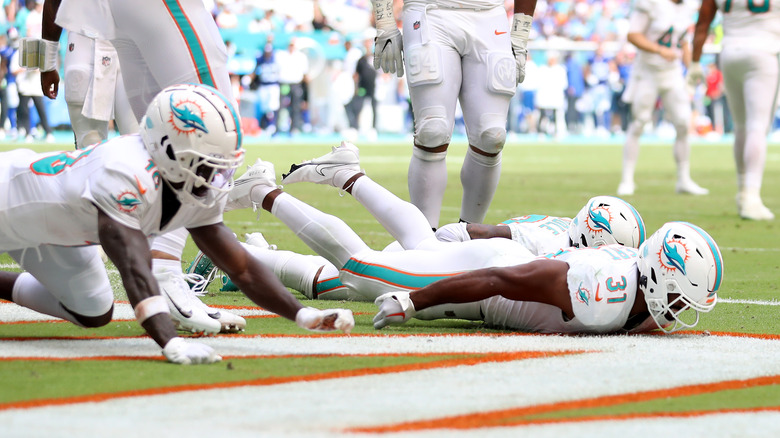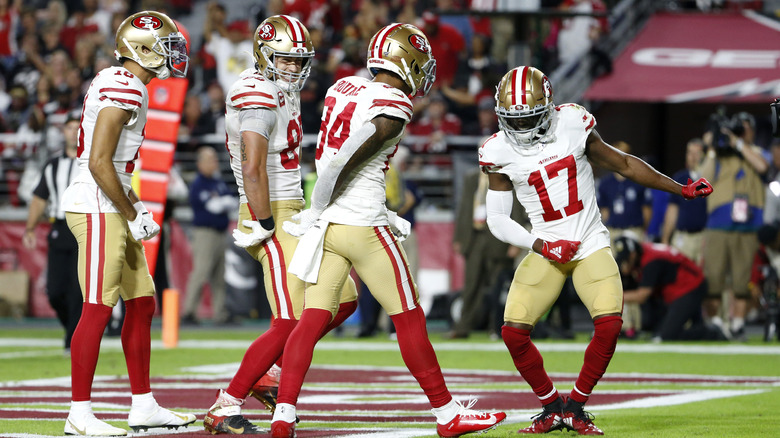Here's How Much The NFL Fines Pro Athletes For Touchdown Celebrations
Most fans enjoy a good touchdown celebration. From choreographed dances to ball spikes to inappropriate t-shirts, touchdown celebrations are nothing if not entertaining. However, did you know that, in 1984, the NFL implemented a rule prohibiting "any prolonged, excessive, or premeditated celebration by individual players or a group of players"? Depending on the length and level of pre-planning required, officials can call unsportsmanlike conduct or taunting penalties against a celebrating player, and these calls can carry some hefty fines.
With that being said, the 1984 rule went largely ignored, and, much to the delight of fans, touchdown celebrations have not gone anywhere. While most mild offenders avoid fines or penalties, there are some notable exceptions (like Terrell Owens, Chad Johnson aka Ochocinco, and even Randy Moss's infamous mooning) who paid heavily for their sometimes elaborate celebrations. In the 2023 season, touchdown celebration fines have affected multiple players but their offenses have not all been seen as worthy of the penalties – especially by fans. So far, the Buffalo Bills wide receiver Stefon Diggs was fined for beer-spraying fans, Detroit Lions running back Jamaal Williams was fined for dancing, and Minnesota Vikings receiver Justin Jefferson for making a subtle "too little" gesture. (Let's not even get into San Francisco 49ers tight end George Kittle's "F*** Dallas" shirt.) While it's not entirely clear why some touchdown celebrations are called out and fined over others, players are paying regardless.
Celebration fines
Per the NFL's infractions and fines schedule for 2023, an on-field unsportsmanlike conduct penalty carries a first-offense fine of $13,659 with a second-offense fine of $19,123. First-offense taunting penalties are $10,927 while second-offense fines are $16,391. If a player sends a football into the stands during their celebration they can be fined an additional $7,649 (with the second offense being $13,113). It's also worth mentioning that the Collective Bargaining Agreement between the NFL and the National Football League Players Association states that these fines will increase by 3% every League Year, meaning touchdown celebrations will only cost even more next season.
Calling an on-field penalty is ultimately at the discretion of the officials in a given game, making the individual calls somewhat subjective. This can also mean that the cut-off point for what constitutes too long and/or elaborate for a touchdown celebration varies widely depending on the official that day — which makes the rule even more complicated to enforce. It's also important to mention that the NFL's competition committee has the power to emphasize stricter adherence to certain calls ahead of new seasons. For instance, in 2021, taunting was emphasized more heavily and called more frequently by on-field officials per the NFL's wishes. This means that, even though the rules as they are written are not being changed, enforcement changes can still affect player's penalties in a season.
Touchdown celebrations today
Despite fans supporting touchdown celebrations, and most sports pundits arguing that they can and should be part of the game, the NFL has continued to clamp down on touchdown celebrations. The fine schedules and penalties of today are the result of the NFL's long-term campaign to try and eliminate touchdown celebrations. In 2006, the NFL changed the original 1984 touchdown celebration rule by implementing a new policy that specifically banned the use of props (including the football) and any celebrations occurring on the ground. As silly as these sound, this new policy also offered a more explicit timeline for the length of time a celebration could take place. Specifically, players are not allowed to celebrate past a first warning from officials.
Then, in 2012, amid a crackdown on taunting, the official rules specifically listed some examples of what qualified as taunting, which included, "sack dances; home run swing; incredible hulk; spiking the ball; throwing or shoving the ball; pointing; pointing the ball; verbal taunting; military salute; standing over an opponent (prolonged and with provocation); or dancing." They also banned spinning the ball in 2013 and dunking over the goalpost in 2014. The NFL has flirted with relaxing these policies on and off over the seasons, making it even harder to determine what qualifies. The NFL does claim that they've collected about $4 million a year in on-field fines since 2011. This money is apparently donated to two organizations: the Professional Athletes Foundation and the NFL Foundation.


